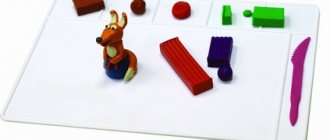A child’s self-esteem is an indicator of success in adulthood. Psychologists say that a correctly formed assessment of personal qualities, both external and internal, ensures a happy life. There are certain stages in the formation of self-esteem in children of preschool and school age. For it to be adequate, parents should pay attention to its development and correction, if necessary.
Forming a child's self-esteem
Children's self-esteem is formed through the judgments of adults, namely parents and teachers. From birth, the baby has no idea how to behave; upbringing plays an important role. The kid pays attention to adults’ assessments, their reactions and tries his best not to disappoint.
You need to make it clear to your child from the very beginning that the world is not ideal and that he cannot know and be able to do everything. Help him open up and discover his talents. Each person is talented in his own way, and it depends on his parents how his fate will turn out. The kid pays attention to his appearance and compares himself with his peers, don’t miss this moment and don’t let him develop complexes.
The development of self-esteem goes through 4 stages
Psychologists identify 4 main stages in the development of children's self-esteem. Each stage is of great importance and mistakes cannot be made in any of them. A person’s character is formed from the first minutes of birth.
Stage 1 – from birth to 18 months
A reverent stage built on internal sensations and tactile contact. A newborn develops trust in the world around him through the care and guardianship of his parents. The first attachment in life appears and the baby already gives preferences in communication. All this is based on unconscious instincts, but still, have you noticed that the baby willingly goes to the arms of some, and may burst into tears at the sight of someone.
The power of a mother's hug is incredible and can do a lot. Adequate self-esteem is formed if parents positively evaluate the baby. Naturally, a newborn will not understand if you tell him this directly; he distinguishes only an emotional assessment: a kind look, hugs, soft touches, a kind and calm timbre of voice.
Stage 2 – from 1.5 to 3-4 years
At this age, the baby becomes incredibly inquisitive and active. He is interested in absolutely everything, and the formation of self-esteem depends on how his parents react to his interest. Don't criticize everything, give them a chance to feel independent. Of course, you can control the situation, but do it delicately. Now everything is in the hands of the parents: whether your child grows up to be an autonomous or dependent person depends only on you. The child is already able to understand that responsibility for his actions lies with him, and not just with his parents. Just do not give a personality assessment in case of an unsuccessful attempt. It may be worth trying again, or perhaps the action is simply bad and should not be repeated.
Stage 3 – from 4 to 6 years
At early preschool age, children begin to take a closer look at themselves and their place in society. For example, they think about how many friends there are in kindergarten and why someone doesn’t want to be friends. The child looks for the reasons for what is happening within himself. Let's say the older brother is not in a good mood today and scolded the younger one. The kid does not understand what he did wrong, but still looks for reasons in himself. At such moments, it is important that adults give an explanation for this action, that the brother is just in a bad mood, but he treats the younger one with love and loves him. Consider whether you have set too many limits and whether children have the opportunity to take initiative.
If your child constantly develops a feeling of guilt for the actions of other people, this is not normal, pay close attention to the child’s process of self-realization.
Stage 4 – school years from 6 to 14 years
The final 4th stage is the longest, most interesting and dangerous in the process of forming children's self-esteem. At this age, a love of work is established and a focus on results begins. The child’s rejection in the society of his peers creates isolation and rejection in him. It may happen that the child loses interest in an activity that he was interested in most recently. This apathy is a consequence of the teenager’s rejection in the team. He loses faith that he is capable of completing tasks and achieving success on an equal basis with others. Sometimes it happens that the most talented and gifted children can withdraw into themselves and lose faith in their own abilities due to difficult relationships in the team.
What to do if a child has high self-esteem?
In order not to create conditions for the formation of inflated self-esteem in a preschooler, it is necessary:
- involve him in doing ordinary household chores that he can do (water flowers, put away toys, etc.);
- don’t over-praise—you shouldn’t admire his ability to eat with a spoon, but it should be noted that he did it carefully;
- praise for taking initiative;
- show an example of adequately assessing your own failures and successes;
- do not compare your baby with others, comparisons are made only in dynamics (today you are better than yesterday);
- spend a lot of time with him.
Show genuine interest in his life.
There are certain phrases that will help form normal self-esteem. They are equally relevant for children with high or low levels. These include:
- “ Your life does not consist only of your successes ” - shows that the desire for something is important, and not just the result.
- “ It’s not a shame to make a mistake, it’s worse to do nothing ” - failure can befall anyone, making the wrong choice is quite normal. The important thing is not to give up.
- “ Unfortunately, injustice also happens ” - not everything turns out the way we want it, but we shouldn’t give up trying to achieve something.
Games for children with high self-esteem
Since a child with high self-esteem often considers himself unique, it is necessary to create situations in which the importance of everyone can be seen. For example:
1. “Magic glasses”
Goal : teach to notice not only something good in yourself, but also in others.
Age : 4 years and older.
Action : You can use masquerade glasses. Whoever puts them on sees only the good in people. Give an example by wearing them. As we approach the participants in the game, we note something special in each one. For example: “Sasha knows how to draw a fish beautifully. Sveta recites poetry well.” They try on glasses one by one, offering to talk about the merits of the person they looked at. You can repeat good qualities, but it is better to help you choose new words, emphasizing something special about your friend.
2. “Our rhythm”
Purpose of the game : to help children understand that correct joint actions create a common, harmonious rhythm.
Age : 4-6 years.
Actions : The adult sets the general rhythm by clapping, the children join in, clearly repeating the strength and tempo of the clapping. The adult slows down the rhythm. Accordingly, the children do the same, gradually calming down. Repeat, offering to set the rhythm for one of the children (choosing children with different levels of self-esteem).
3. "The Biggest Ball"
Goal : to make it clear that, being in equal conditions, everyone can win.
Age : 6 years.
Actions : Everyone has the same balloons. Offer to fool them. The winner is the one who gets the biggest one. The game can be continued. For example, toss up who is higher.
It is important to correctly comment on the outcome of games and exercises in accordance with the goal.
How to build adequate self-esteem
First of all, I would like to note that adequate self-esteem is an important indicator in the formation of an individual’s mental health. Such a person is able to perceive reality as it is and, without trying to change the world, easily adapts to life. The success and comfortable existence of an individual in society depends on adequate self-esteem. If you are determined to raise a healthy and happy child, and this is what all parents dream of, think about your behavior.
There comes a period when girls copy their mothers, and boys copy their fathers. Much depends on the attitude of parents towards each other. And remember that children have very developed intuition. Don't try to deceive them with an external picture. If mom or dad are not confident in themselves, cannot defend their opinion and constantly complain about life, you should not think that the baby does not notice this. Below we describe in more detail several effective techniques for developing adequate children's self-esteem. Check yourself to see if everything is fine in your family.
Check whether excessive conditions have been created
Let's say you start to notice that your child is overly criticizing himself. Expressions began to appear in his vocabulary: “I can’t do anything,” “I’ll never succeed,” “I’ll never be able to.” Let's figure it out. The key point here is: “they began to notice.” That is, before the child was cheerful, showed interest in knowledge, and suddenly it doesn’t work out and he doesn’t want anything.
Let's look at an example. Two girls studied in 5-A: Masha and Katya. Both were diligent students, were very friendly, and their parents also communicated well with each other. At one of the family holidays, Katya’s mother said that her daughter has an incredible talent for drawing and she is very happy about it. “Drawing is wonderful, not like some dangerous sport,” the woman said.
For some reason, Masha’s mother immediately decided that the children should definitely go to classes together, without finding out whether her daughter had this talent. “All children love to draw,” she thought. Less than two months had passed when the teacher noted Katya and began recommending her works for all kinds of children's competitions, and the Machines' works were mediocre children's drawings. The girl lost faith in her own abilities, began to study worse due to lack of self-confidence, and did not even want to be friends with her friend, who turned out to be more successful than her.
Everything could have turned out differently if Masha’s mother had not created inflated conditions for her.
Do not force anything on your children, rather help them decide on their desires, and if the child does not have any special talents, praise him for good grades, because this is his work. Just don’t compare him with others in his favor, this may have negative consequences in the future.
Peer opinion
Indeed, the opinion of peers is very important. First, understand the situation: if someone said something bad about your son or daughter, this is not a reason to run to school to restore justice. The child's psyche is a fragile thing and breaks very quickly. The criteria for assessing children are very high and sometimes defy logic.
Children may mock only because a peer is slightly fatter or is a better student than others. If there is open bullying, it is better to transfer to another school. Most likely, absolutely normal and adequate relationships will develop in the new team. Give your teenager a chance to correct the situation on his own and feel important in the team. Have a conversation about what not to do. Remember, you should not criticize your child. You can evaluate actions, but not a person.
If the situation is not critical and the teenager asks for some non-standard items in his wardrobe, so as not to stand out from the crowd of his peers, ask him to justify his request. If he wants ripped jeans, and he made this decision on his own, then why not. Sometimes it is better to sacrifice your parental principles for the future benefit of the whole family.
Praise
Children and adults are very similar. Unless an adult has more responsibility. If the question arises about how to help increase children's self-esteem, listen to yourself. To help you? That's right, praise! You like it when management praises you, even if without a promotion and without an increase in wages, but how nice it is to hear praise for the good result of the work you have done.
So the baby is pleased when you praise him. Just praise for what you do, and not just like that. A developing personality must have a clear understanding of what is good and what is bad. This is how adequate self-esteem and assessment of reality as a whole are formed.
Overcome difficulties
Here again there is an intersection with adult life. For example, you have a catastrophic lack of time to go to the gym, but the desire to get your dream figure outweighs. After a hard day at work, you rush to the gym and after a few months the long-awaited result is noticeable. Would you be proud of yourself? Naturally, yes! Increased self-esteem is guaranteed.
So it is with a child’s self-esteem. Overcoming difficulties, the baby will learn to respect and love himself. You should not aim at global tasks. Start small. Let the baby do pull-ups on the horizontal bar with daddy's help 3-4 times. Achievement? Certainly! Don't forget to praise your son.
Girls, especially in adolescence, are not confident in their beauty and attractiveness. Uncertainty takes a huge toll on self-esteem. Take your daughter to a salon or a photo shoot. See how her mood changes. Transformation in appearance and self-acceptance is an important point in the formation of adequate self-esteem.
MAGAZINE Preschooler.RF
FORMATION OF ADEQUATE SELF-ESTEEM OF A PRESCHOOL CHILDRENObjectivity of self-esteem is included in one of the components of psychological readiness for school – personal readiness. Therefore, the formation of adequate self-esteem becomes an important issue for parents and teachers.
Self-esteem is a person’s assessment of his capabilities, qualities and place among other people.
A preschooler’s self-esteem is formed, on the one hand, under the influence of adults’ praise and their assessments of the child’s achievements, and on the other hand, under the influence of the sense of independence and success that the child experiences in various activities.
A healthy atmosphere in the family, the desire to understand and support the child, sincere participation and empathy, a sense of psychological security - these are the components for the formation of positive adequate self-esteem in the child.
A child with high self-esteem may believe that he is right in everything. He strives to control other children, seeing their weaknesses, but not seeing his own, often interrupts, treats others down, and tries with all his might to attract attention to himself. From a child with high self-esteem you can hear: “I am the best.” With inflated self-esteem, children are often aggressive and belittle the achievements of other children.
If a child's self-esteem is low, most likely he is anxious and unsure of his own abilities. Such a child always thinks that he will be deceived, offended, underestimated, always expects the worst, and builds a defensive wall of mistrust around himself. He strives for solitude, is touchy, and indecisive. Such children adapt poorly to new conditions. When performing any task, they are set up for failure, finding insurmountable obstacles. Children with low self-esteem often refuse new activities for fear of failure, overestimate the achievements of other children and do not attach importance to their own successes.
Low, negative self-esteem in a child is extremely unfavorable for the full development of the individual. Such children are in danger of developing the attitude “I am bad”, “I can’t do anything”, “I am a loser”.
With adequate self-esteem, the child creates around himself an atmosphere of honesty, responsibility, compassion and love. He feels valued and respected. He believes in himself, although he is able to ask for help, is able to make decisions, and can admit that there are mistakes in his work. He values himself, and therefore is ready to value those around him. Such a child has no barriers that prevent him from experiencing a variety of feelings towards himself and others. He accepts himself and others as they are.
So, a preschooler sees himself through the eyes of close adults who are raising him. If the assessment and expectations in the family do not correspond to the characteristics of the child, his ideas about himself will be distorted.
Adequate self-esteem helps a preschooler master new activities and, without doubt or fear, get involved in preparation for school.
To develop adequate self-esteem in a child
- Don’t protect your child from everyday affairs, don’t try to solve all his problems for him, but don’t overload him either. Let your child help with the cleaning, enjoy the work done and receive well-deserved praise. Set feasible tasks for your child so that he can feel skillful and useful.
- Don't overpraise your child, but don't forget to reward him when he deserves it.
- Remember that to form adequate self-esteem, both praise and punishment must also be adequate.
- Encourage initiative in your child.
- Show by your example the adequacy of your attitude towards successes and failures. Compare: “Mom’s pie didn’t turn out well - well, that’s okay, next time we’ll put more flour . Or: “Horror! The pie didn't work out! I will never bake again!” .
- Don't compare your child to other children. Compare him with himself (what he was yesterday or will be tomorrow).
- Scold for specific actions, not in general.
- Remember that negative feedback is the enemy of interest and creativity.
- Analyze his failures together with your child, drawing the right conclusions. You can tell him something using your example, so the child will feel an atmosphere of trust and understand that you are closer to him.
- Try to accept your child for who he is.
Games and tests that will help determine your child's self-esteem
Test "Ladder" ("Ten steps")
Draw on a piece of paper or cut out a ladder of 10 steps. Now show it to the child and explain that on the lowest step there are the worst (angry, envious, etc.) boys and girls, on the second step - a little better, on the third even better, and so on. But at the very top step are the smartest (good, kind) boys and girls. It is important that the child correctly understands the location on the steps; you can ask him about this.
Now ask: on what step would he stand? Let him draw himself on this step or put a doll. Now you have completed the task, all that remains is to draw conclusions.
If a child places himself on the first, 2nd step from the bottom, then he has low self-esteem, if on the 3rd, 4th, 5th, 6th, 7th, 8th, then he has average (adequate) , and if it is on the 9th, 10th, then self-esteem is too high.
Attention: in preschoolers, self-esteem is considered too high if the child constantly puts himself at the 10th level.
“Name” (N.V. Klyueva, N.V. Kasatkina)
This game can provide additional information about a child's self-esteem.
You can invite your child to come up with a name that he would like to have, or leave his own. Ask why he doesn't like or like his name, why he would like to be called differently. This game can provide additional information about your baby's self-esteem. After all, often giving up one’s name means that the child is dissatisfied with himself or wants to be better than he is now.
“Playing out situations” (N.V. Klyueva, Yu.V. Kasatkina)
The child is offered situations in which he must portray himself. Situations can be different, invented or taken from life. Other roles during the enactment are performed by one of the parents or other children. Sometimes it is useful to switch roles. Example situations:
- You took part in the competition and took first place, and your friend was almost last. He was very upset. Help him calm down.
- Mom brought 3 oranges for you and your sister (brother). How will you divide them? Why?
- The guys from your group in kindergarten are playing an interesting game, and you are late, the game has already started. Ask to be accepted into the game. What will you do if the children don't want to accept you? (This game will help your child learn effective behavior patterns and use them in real life.)
Techniques for increasing a child’s self-esteem:
- Ask for advice as an equal or elder. Be sure to follow the child’s advice, even if it is far from the best, since the educational result is more important than any other.
- Ask for help as a peer or elder.
- There are moments when an all-powerful adult needs to be a junior - weak, dependent, helpless, defenseless... from a child!
Already at the age of 5-7, this technique, used from time to time, can give miraculous results.
Techniques for normalizing a child’s high self-esteem:
- Teach your child to listen to the opinions of people around him.
- Take criticism calmly, without aggression.
- Teach to respect the feelings and desires of other children, as they are just as important as your own feelings and desires.
We praise and punish
Of great importance in the formation of a child’s self-esteem is the interested attitude of an adult, approval, praise, support and encouragement - they stimulate the child’s activities and form moral habits of behavior. Physiologist D.V. Kolesov O. If a child does not receive timely approval during an activity, he develops a feeling of insecurity.
However, you also need to praise correctly! Understanding how important praise is for a child, it must be used very skillfully. Vladimir Levi, author of the book “The Non-Standard Child,” believes that there is no need to praise a child in the following cases:
- For what was not achieved through one’s own labor - physical, mental or spiritual.
- Beauty and health are not subject to praise. All natural abilities as such, including good character.
- Toys, things, clothes, random finds.
- You can't praise out of pity.
- Out of a desire to please.
Praise
It is important to remember that absolutely all children are talented in their own way. Parents should be more attentive to their children in order to find the talent inherent in the child and develop it. It is important to encourage any child’s desire for self-expression and development. Under no circumstances should you tell a child that he will not become a great singer, dancer, etc. With such phrases, you not only discourage a child from wanting to do anything, but also deprive him of self-confidence, lower his self-esteem, and reduce motivation.
Be sure to praise your children for any achievements: for good grades at school, for winning sports competitions, for a beautiful drawing.
One of the methods of praise can be an advance, or praise for what will happen. Approval in advance will instill in the child faith in himself and his strength: “You can do it!” , “You can almost do it!” , “You will definitely succeed!” , "I believe in you!" , “You will succeed!” etc. Praising a child in the morning is an advance for the whole long and difficult day.
Vladimir Levi advises remembering the child’s suggestibility. If you say, “Nothing will ever come of you!” , “You are incorrigible, you have only one road (to prison, to the police, to an orphanage, etc.)” - then don’t be surprised if this happens. After all, this is a real direct suggestion, and it works. The child may believe in your attitudes.
Punishments
Not only encouragement, but also punishment plays an important role in the formation of self-esteem. When punishing a child, you should follow a number of recommendations.
- Punishment should not harm health - neither physical nor psychological. Moreover, punishment must be useful.
- If there is any doubt whether to punish or not to punish, do not punish. Even if they have already realized that they are usually too soft and indecisive. No "prevention" .
- One punishment at a time. The punishment can be severe, but only one, for everything at once.
- Punishment is not at the expense of love. Whatever happens, do not deprive your child of your warmth.
- Never take away things given by you or anyone else - ever!
- You can cancel the punishment. Even if he acts so outrageously that it couldn’t be worse, even if he just yelled at you, but at the same time today he helped the sick or protected the weak. Don't forget to explain to your child why you did this.
- It is better not to punish than to punish belatedly. Belated punishments instill in the child the past and prevent him from becoming different.
- Punished - forgiven. If the incident is over, try not to remember the “old sins” . Don't bother me to start living again. Remembering the past, you run the risk of creating a feeling of “eternal guilt” .
- No humiliation. If the child believes that we are unfair, punishment will have the opposite effect.
We do not punish:
- If the child feels unwell or is sick.
- When a child eats, after sleep, before bed, during play, while working.
- Immediately after mental or physical trauma.
- When a child cannot cope with fear, with inattention, with mobility, with irritability, with any shortcoming, making sincere efforts. And in all cases when something doesn’t work out.
- When the internal motives of an action are unclear to us.
- When we ourselves are not ourselves, when we are tired, upset or irritated for some reason...
Good luck in your cooperation with your child!
| Next > |
Why is self-esteem needed?
Self-esteem helps you adequately assess your strengths and capabilities. The child can also evaluate actions and divide them into good and bad. If a child is motivated correctly, then self-esteem helps him gather strength and not give up at the first failure in completing a particular task. The role of self-esteem in a child’s life is very important.
The most common values for a child’s self-assessment include the following roles:
Self-assessment performs the following functions:
- motivates;
- develops the ability for self-analysis;
- teaches;
- stimulates.
It is thanks to adequate self-esteem that children are able to study well, engage in their favorite hobbies and build healthy relationships with peers.
Self-esteem of a junior schoolchild: diagnosis
We understood the importance of adequate self-esteem. Now it's time to talk about diagnostics. A depressed mood will not always tell you about low self-esteem. Sometimes it happens that a cheerful and active child in the family feels like a complete stranger among his peers. He is afraid of being misunderstood and therefore keeps his opinions to himself. School psychologists conduct tests that can help determine a child’s level of self-esteem. After all, this question is of interest to both teachers and parents.
Methodology for determining self-esteem in primary school age
It is worth noting that adequate self-esteem in school-age children is very rare. Most often it is either overestimated or underestimated. In this case, there is no need to sound the alarm, just watch the student more closely. At this age, instability is more the norm than a deviation. But the child’s future depends on how accurately parents and teachers can unobtrusively help their child. So, there are several methods for determining the level of self-esteem in schoolchildren:
- The teacher invites children to portray themselves as a loved one or, in general, any fairy-tale character with a fictitious name. Describe the qualities that the character is endowed with, and on the basis of this, an experienced specialist is able to determine what kind of personality is hidden behind this or that drawing.
- An integrated approach to the problem involves the development of special surveys. After analyzing the students’ responses, the psychologist will determine the adequacy of each person’s self-esteem and deviations from the norm.
- At first glance, the last method is the most primitive: depict yourself on a piece of paper. But that's not true. The child draws himself as he wants to be, and based on this drawing, the specialist will determine what the baby lacks and whether his demands on himself are fair.
In the situation of developing healthy self-esteem in children, the opinion of a specialist is very important. If it suddenly happens that parents are invited to a conversation by a school psychologist, you should not ignore this invitation. Take it seriously.
How to determine a preschooler's self-esteem
Diagnostics of self-esteem helps to identify problems of personality development and self-knowledge of children of senior preschool age. Timely detected assessment deviations from the norm are easily corrected. The “Ladder” technique is a well-known method for diagnosing the type of self-esteem of a preschooler. The test helps to identify the attitude towards oneself, as well as determine how, in one’s opinion, others evaluate him. Such testing is quite accessible to parents. It can be done in a playful way.
To carry out the test, you will need a sheet of paper, a drawn staircase of seven steps, a figurine of a boy or girl, and a pencil. You need to ask the children to place the figure opposite the step they want to choose. The guys need to voice the following conditions :
- the first step is the best guys;
- the second place was taken by the good guys;
- the third is neither bad nor good;
- fourth – more bad than good;
- fifth – bad;
- sixth – very bad;
- The seventh place was taken by the worst guys.
The chosen step will be an indicator of self-esteem. Interpretation of test results :
- the first and second steps are chosen by children with high self-esteem;
- the third step speaks of adequate self-esteem;
- the fourth - sixth show an underestimation;
- the seventh is extremely underestimated.
The results of the technique help to reveal children’s internal problems, correct self-esteem, and develop the ability to correctly assess one’s own personality.
Three main types of self-assessment by children
There are 3 options for the results of self-esteem studies: adequate (but this is very rare for children, as you understand), underestimated or overestimated. These studies are carried out to identify deviations. Let us examine in more detail the positive and negative aspects of all three options.
Overpriced
Such children are overly self-confident and, as a rule, overly independent. The rules of society are not written for them and only they can decide what to do. A child with high self-esteem does not even need parental advice and knows what to do. Ready to take on the most difficult tasks, thereby risking failure because he did not adequately assess his strength.
Such children should always be the first and their desire is commendable, the main thing is not to cross the line. The child needs to be explained that not all means are good on the way to the goal. Such a kid prefers not to comply with agreements; he is not interested in it and the condemnation of society is absolutely indifferent.
Understated
At primary school age, a child’s self-esteem is often low. The kid refuses difficult tasks, doubting his own abilities. The child deliberately refuses high marks because he is not confident in himself. This entails more serious problems. For example, isolation, problems communicating with peers. The child deliberately lowers his standards, which is why it is so important to praise the child and not just like that, but for his achievements. Even if they are small and insignificant, the parents’ task is to focus on the positive aspects.
Don't let your child think about troubles, set him up for positive thinking and let him know that your child deserves better.
Adequate
It is very rare for a child to have adequate self-esteem, but it still exists. Such children are sociable, active and enjoy learning. Difficult tasks do not frighten them. If they failed to complete the task, they will adequately accept criticism and take into account everything the teacher said. Usually the whole team is drawn to such children, as they know how to interest and organize their peers.
Characteristics of self-esteem levels
From a psychological point of view, there are three levels of self-esteem. When determining this quality, one cannot operate solely in terms of “good and bad.” A more in-depth approach is needed here, taking into account some features.
Low self-esteem
If a child succumbs to the influence of others, he exhibits:
- diffidence,
- indecision,
- shyness,
- excessive caution
- These are indicators of low self-esteem. Such children simply need the approval and support of others.
The existing inferiority complex does not allow him to set high goals for himself. And the means to achieve them are not always worthy. Such children are often fixated on their failures and are afraid to change the usual course of events.
They grow up to be closed and envious, overly demanding and self-critical, cruel and vindictive people. Having decided that a loser is their role, they simply do not notice their opportunities and successes. External portrait of a person with low self-esteem:
- the head is pulled into the shoulders;
- indecisiveness in gestures and actions;
- "running" look.
Such manifestations in childhood should cause anxiety in parents and a desire to immediately try to correct the situation.
Heightened self-esteem
Often a child with high self-esteem complains that no one wants to be friends with him. This comes from the fact that he constantly tries to convince others of his superiority and requires recognition of his uniqueness. Believes he is underestimated.
Neither the advice of parents nor the opinions of others are important for such children. They take on impossible tasks and risk failure. The child attributes failure to chance, someone else’s fault. He perceives criticism as pickiness.
Children with high self-esteem gradually develop rudeness, aggression, rigidity, and quarrelsomeness. Externally, the following characteristic features are also determined:
- head held high and back straight;
- long, direct gaze;
- "commander" tone.
Such people strive to be the first in everything. This desire is worthy of praise, but it is worth explaining that not all means to achieve goals are good.
Adequate self-esteem
Success in society, in professional activities, in interpersonal relationships largely depends on a person’s ability to balance strengths and capabilities. That is, it is very important that a child develops adequate self-esteem from early childhood.
This level allows the little person to normally perceive healthy criticism, correctly assess the goals and his strengths (the chance to complete the task). A real assessment of oneself generates a feeling of stability and inner harmony. This is the key to a positive attitude towards others. A person with such a behavioral reaction will be able to fully demonstrate his advantages, compensating for his existing shortcomings.
Thanks to the descriptions presented above, you can determine the child’s level of self-esteem. And a thoughtful approach to development and education will help correct it.
Ways to correct self-esteem
By putting self-esteem correction methods into practice, you will help your child avoid difficulties in the future.
- Don't compare your child with his peers. It is unacceptable to say: “But Dima has already completed his homework and is walking in the yard, and you are still sitting over your textbook.” Parents must understand that each child has different abilities - this is the first thing. The most important task of a parent is to discern his child’s talent or lack thereof. Evaluate your child's abilities soberly. There are no people who are successful in all areas.
- Don't forget to praise your child. For most children, praise is the biggest motivator. Praise your child for the result of something. The baby will conquer new and new heights for the sake of the cherished words of mom and dad: “what a great guy you are,” “we are proud of you,” “keep it up.”
- Respect your child's personal space. It is important for a child that close people value his world. Treat your child's personal belongings and toys with care. Let him understand that he is loved, appreciated and respected.
- Adequately assess your child's abilities. You should not make excessive demands on your baby. If your son or daughter is in 2nd grade, they are not required to know the 5th grade program, even if one of their classmates easily mastered the program.
- Don't criticize the person. Don't scold or yell at your baby if everything doesn't work out the first time. Better help overcome difficulties and enjoy successes and achievements together.
Talk to your child more often, so you will understand what he is missing. Trusting relationships between parents and children are much easier to form in a child’s preschool age than in adolescence.
Low self-esteem of preschoolers
Low self-esteem in children of senior preschool age is rare and is a deviation in personality formation. The characteristics of such guys are manifested in their behavior:
- very often they are characterized by shyness, isolation, an unstable emotional background, for example, they may suddenly burst into tears;
- they try to avoid responsible decisions and take a deliberately simple position;
- during public speaking they show lower results than when performing individual work;
- feeling failure, they stop performing any activity;
- they have few friends, as they try to avoid large companies.
Insecure children often have dysfunctional families and low social status. This causes constant ridicule from their peers and places them in the category of outcasts. Incorrect assessment of personality can arise as a result of a constant negative environment created by the parents themselves. For example, the mother constantly pulls the baby back, scolds him for any mistakes and pranks, and doubts his abilities. The kid is sure that if he did not cope well with one task, he will also not complete another task. Children with low self-esteem have the following problems :
- conflict when communicating with peers;
- have poor personality development;
- They often display anger and hostility.
Important! Adults should remember: senior preschool age is a period when every rude word and unfounded criticism can have a detrimental effect on socialization. The child needs to be loved, supported, accepted all his qualities, and helped to get rid of negative ones.
Features of self-esteem in children
In childhood, the circle of friends is extremely narrow. Basically, only parents can influence the formation of self-esteem from the outside. At school age, classmates and teachers are added to them. A child is often in a situation where he must relate to himself in some way in order to evaluate his actions. The child’s behavior and his communication in society in the future depend on such self-analysis.
In preschool age
At this age there is a very fine line between the assessments of adults. The baby is already aware of his importance in this world and his judgments about himself are based solely on the assessment of him by adults. Most often he hears praise and admiration, so at this age most children have high self-esteem. But do not rush to exchange mercy for criticism for balance. Criticizing a child at this age is dangerous - it threatens low self-esteem, and it will be much more difficult to cope with.
At primary school age
At primary school age, a child’s role in society becomes incredibly important. Self-esteem depends on how peers react to him. At the same time, the role of parents is still important. Don't forget to praise and encourage your child for his achievements.
At middle school age
At this age, a child’s self-esteem depends on public opinion. If a child occupies a leading position in the class, his self-esteem is clearly inflated, and if the child is an outcast, naturally, the level of self-esteem is the lowest.
In high school age
Position in the team plays an important role in the formation of adolescents’ self-esteem. It is worth noting that this is not the only evaluation criterion. A teenager cares about his successes and achievements. It is important that at an early age parents adequately assess the child’s abilities and do not impose on him what he does not like. It is extremely important for a teenager to feel important and visually attractive.
What is children's self-esteem
Before he goes to school, his character and personality go through the process of formation. The self-esteem of a preschool child is formed on the basis of a person’s opinion of himself. From early childhood, an individual evaluates his physical capabilities and appearance. As a person grows up, skills acquired through practice come into focus. Children begin to attach more importance to moral qualities.
The peculiarities of self-esteem in preschool children are that all the child’s actions are imprinted in his subconscious. For an individual, it is important to perceive himself and how his actions are perceived by other people. The child’s relationships with his mentors and peers play a role here.
For a preschooler, it is important what others think about him, what opinion children of the same age have, and how adults evaluate their actions. On this path, the student either begins to obey stereotypes or develops his own norms of behavior.
A preschooler's self-esteem is formed on the basis of skills and coordination of his own desires. The student has intentions, tries to realize them, correlates actions with his own capabilities and the capabilities of other people. The child strives to find a common language with his peers and seeks approval from adults.
In psychology, the self-esteem of a primary school student is formed on the basis of his key activities. What matters is who surrounds the child and how high-quality the interaction becomes. Leading activities may be related to achievements in school or kindergarten. Here the student must learn to control his own behavior. It lays down an adequate assessment of the individual. At each stage, children should strive to maintain attention, accuracy and patience. Once such qualities are developed, positive results immediately appear. This is the key to positive self-esteem at primary school age.
What are the dangers of low self-esteem?
Low self-esteem is directly related to quality of life. Low self-esteem will prevent a person from becoming happy. A person who is dissatisfied with himself cannot be happy. Relationships in society for such a person do not work out. As a rule, a dream job remains a dream forever, since self-doubt does not give a chance to express oneself. And these are the smallest reasons why low self-esteem should be corrected. The tendency to depression in adulthood is also the result of inadequate self-esteem.
How to increase self-esteem
Self-esteem is much easier to correct in childhood. Parents and teachers are the first helpers in this difficult task. It is difficult for a child to adequately evaluate himself; adults must come to his aid. Help your child find something he likes, be proud of him and encourage his small victories. It is important for a child to know and feel that he is loved and respected. Teach your child to defend his point of view and make it clear that it is impossible to please everyone. Explain that no one will encourage the victim's condition and that it is worth thinking about yourself, of course, not to the detriment of others. Help your child learn to justify their decisions.
Self-esteem in children with disabilities
It is important for special children to understand that they are needed by society and are not a burden. Perception depends on the attitude of the parents. Some treat their child with trepidation and patience, while others may lash out at the baby due to fatigue. Try to find friends with similar interests for this child. A child, doing what he loves, will understand his importance and value. And don’t forget to remind him of what a great guy he is.
It is fair to talk to your child about the fact that not all people are the same, and there are different situations in life, but difficulties are given in order to overcome them. Every day tell your child with disabilities how great he is.







